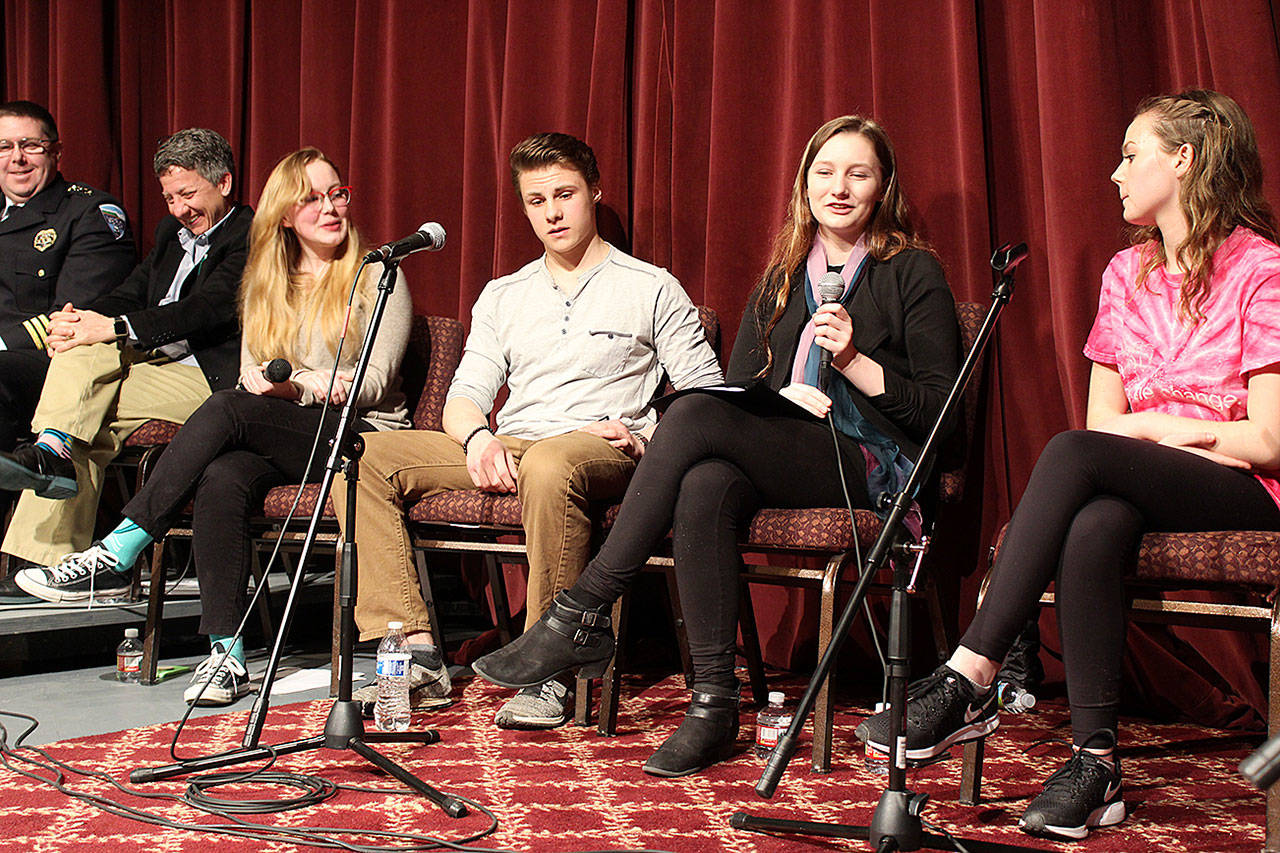They’re not old enough to vote, buy beer or rent a car.
But South Whidbey High School teens proved they are adults when it comes to leading a community forum — maybe even better than their elders.
And that they do their homework.
Thursday evening, seven students led a public discussion about how to make schools safer at Whidbey Island Center for the Arts, which sponsored the forum.
They were joined on stage by South Whidbey School Superintendent Jo Moccia, Langley Mayor Tim Callison, Langley Police Chief David Marks, Island County Commissioner Helen Price Johnson and Chief Criminal Deputy Rick Felici with the Island County Sheriff’s Office.
After last week’s national school walkout to remember victims of the mass shooting in Florida, Stacie Burga, WICA executive director, told the audience she felt the community wanted to hear “our students and what’s on their minds.”
She asked that the forum not be turned into a polarizing discussion about gun rights and gun control unless the students wanted such a conversation.
“We will respect them and then we will be very respectful to each other,” Burga said to the nearly 100 people in attendance.
Students talked about their fears, anxiety, access to mental health services and what it’s like to grow up as “the mass shooting generation.”
“I go to school to learn,” Sophie Hamer answered when asked how much classroom violence weighs on her mind. “The time I’m in class, it’s on my mind all the time. It’s something I don’t want to think about. It’s scary and I’m trying to learn along with every other student across the nation.”
The 90-minute discussion, which included taking questions from the audience, proved a lesson in the Socratic method, Superintendent Moccia commented as she praised students for “leading by example.”
Strong sentiments and opinions emerged on both sides of gun reform which seemed inevitable when bullets are the reason that this generation’s curriculum includes lockdowns and active shooter drills.
Jessica Johnson, president of the school’s Social Justice Club, said she felt compelled to “give voice to those who have been taken too soon.” She and other members of the club advocated banning assault-style rifles, stronger legislation to keep children from getting their hands on guns and expanding background checks.
Aryeh Rohde, youth leader of South Whidbey Libertarians, recited the statistic that people were 38 percent more likely to be hit by lightening than by an active shooter, and that 11 kids a day are killed in car accidents.
He also pointed out examples he found counter intuitive to protecting students.
“Since 1956, in all the mass shootings, 99 percent are committed in gun-free zones,” he said. “The potential shooter knows he has no threat. There’s a saying, ‘don’t bring a knife to a gun fight.’ We can’t bring either into school.”
He also called the “shelter in place” strategy “a little odd.” Duck hunters, he pointed out, know they aren’t supposed to shoot at sitting ducks because it’s too easy.
“So why are we sheltering in place?” he asked. “We may lock the doors but they aren’t bullet proof.”
Pointing to Tuesday’s incident in Maryland when a school resource officer shot and killed a 17-year-old firing at students, Rohde said he was “open to ideas on how we can solve this together.”
All of the students on stage were born after the 1999 Columbine shooting. Boomers in the audience, and on the left side of the panel, came of age during political assassinations, the Kent State killings and the civil rights movement.
Bombs, not guns, filled their young minds with fear. A person in the audience recalled practicing “duck and cover” drills — hiding under desks in case of a nuclear attack — “like that’s going to save you.”
While most students said they felt safe growing up in South Whidbey, it didn’t stop some from asking why society keeps allowing children to be gunned down in classrooms.
Tessa Sherman asked why Americans weren’t “shocked into action” when 12 students and one faculty member were massacred at Columbine High School by two students who also used bombs and other explosive devices in a complex, highly planned attack.
Instead, almost 20 years later, nothing seems to have changed, she said. “Now, 17 more people have died that shouldn’t have.”
“We can’t stop kids from being hit by lightening,” Sherman added. “But we can stop mass shootings.”
Panelists repeatedly brought the conversation back to the big questions of why these shootings are happening and what to do about them.
“We grew up in a culture of violence,” student Annika Hustad pointed out. “Personally, I don’t think the problem is guns. It’s the reaction our society has to violence.”
After discussing the local protocols in place in response to a school shooting, Felici called the issue “a multi-faceted problem.”
“Until we figure out why youth are killing each other we have to do something,” he said. “Do we want to staff our schools with people armed to respond in the event of a horrifying mass shooting?”
That question elicited strong responses, for and against.
Rohde said it seemed logical to protect schools like other facets of society, such as airplanes which have marshals on board.
“Why are we not willing to protect students with firearms?” he asked. “We protect the president that way, celebrities even.”
Others recoiled at the idea.
“We need to take guns out of the hands of people who shouldn’t have them,” Johnson responded. “That’s how you can protect me. I do not want to be protected by adding more guns to the situation.”



